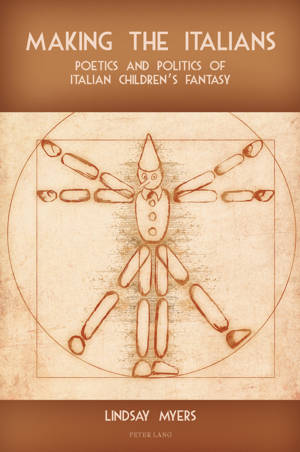
- Afhalen na 1 uur in een winkel met voorraad
- Gratis thuislevering in België vanaf € 30
- Ruim aanbod met 7 miljoen producten
- Afhalen na 1 uur in een winkel met voorraad
- Gratis thuislevering in België vanaf € 30
- Ruim aanbod met 7 miljoen producten
Zoeken
Making the Italians; Poetics and Politics of Italian Children's Fantasy
Poetics and Politics of Italian Children's Fantasy
Lindsay Myers
Paperback | Engels
€ 59,45
+ 118 punten
Omschrijving
Italian children's literature has a diverse and unusual tradition of fantasy. With the exception of Carlo Collodi's Pinocchio, however, it has remained almost entirely unknown outside of Italy. Why is it that Italian children's fantasy has remained such a well-kept secret? How 'international' is the term 'fantasy', and to what extent has its development been influenced by local as well as global factors? Cross-cultural and cross-linguistic research into this neglected area is essential if we are to enrich our understanding of this important literary genre.
This book charts the history and evolution of Italian children's fantasy, from its first appearance in the 1870s to the present day. It traces the structural and thematic progression of the genre in Italy and situates this development against the changing backdrop of Italian culture, society and politics. The author argues that ever since the foundation of Italy as a nation-state the Italian people have been actively involved in an ongoing process of identity formation and that the development of children's fantasy texts has been inextricably intertwined with sociopolitical and cultural imperatives.
This book charts the history and evolution of Italian children's fantasy, from its first appearance in the 1870s to the present day. It traces the structural and thematic progression of the genre in Italy and situates this development against the changing backdrop of Italian culture, society and politics. The author argues that ever since the foundation of Italy as a nation-state the Italian people have been actively involved in an ongoing process of identity formation and that the development of children's fantasy texts has been inextricably intertwined with sociopolitical and cultural imperatives.
Specificaties
Betrokkenen
- Auteur(s):
- Uitgeverij:
Inhoud
- Aantal bladzijden:
- 256
- Taal:
- Engels
Eigenschappen
- Productcode (EAN):
- 9783039113613
- Verschijningsdatum:
- 28/11/2011
- Uitvoering:
- Paperback
- Formaat:
- Trade paperback (VS)
- Afmetingen:
- 152 mm x 229 mm
- Gewicht:
- 362 g

Alleen bij Standaard Boekhandel
+ 118 punten op je klantenkaart van Standaard Boekhandel
Beoordelingen
We publiceren alleen reviews die voldoen aan de voorwaarden voor reviews. Bekijk onze voorwaarden voor reviews.











